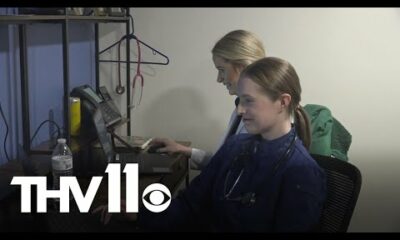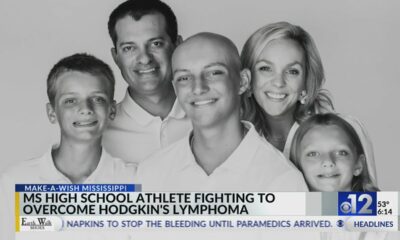Mississippi Today
She was accused of murder after losing her pregnancy. South Carolina woman now tells her story.

Content warning: This story contains details of a pregnancy loss.
ORANGEBURG, S.C. — Amari Marsh had just finished her junior year at South Carolina State University in May 2023 when she received a text message from a law enforcement officer.
“Sorry it has taken this long for paperwork to come back,” the officer wrote. “But I finally have the final report, and wanted to see if you and your boyfriend could meet me Wednesday afternoon for a follow up?”
Marsh understood that the report was related to a pregnancy loss she’d experienced that March, she said. During her second trimester, Marsh said, she unexpectedly gave birth in the middle of the night while on a toilet in her off-campus apartment. She remembered screaming and panicking and said the bathroom was covered in blood.
“I couldn’t breathe,” said Marsh, now 23.
The next day, when Marsh woke up in the hospital, she said, a law enforcement officer asked her questions. Then, a few weeks later, she said, she received a call saying she could collect her daughter’s ashes.
At that point, she said, she didn’t know she was being criminally investigated. Yet three months after her loss, Marsh was charged with murder/homicide by child abuse, law enforcement records show. She spent 22 days at the Orangeburg-Calhoun Regional Detention Center, where she was initially held without bond, facing 20 years to life in prison.
This August, 13 months after she was released from jail to house arrest with an ankle monitor, Marsh was cleared by a grand jury. Her case will not proceed to trial.
Her story raises questions about the state of reproductive rights in this country, disparities in health care, and pregnancy criminalization, especially for Black women like Marsh. More than two years after the U.S. Supreme Court issued its Dobbs v. Jackson Women’s Health Organization decision, which allowed states to outlaw abortion, the climate around these topics remains highly charged.
Marsh’s case also highlights what’s at stake in November. Sixty-one percent of voters want Congress to pass a federal law restoring a nationwide right to abortion, according to a recent poll by KFF, the health policy research, polling, and news organization that includes KFF Health News. These issues could shape who wins the White House and controls Congress, and will come to a head for voters in the 10 states where ballot initiatives about abortion will be decided.
Current Mississippi law bans abortions “except in the case where necessary for the preservation of the mother’s life” or where the pregnancy was caused by rape and reported to law enforcement. Doctors who perform abortions outside of those parameters face up to 10 years in prison, in addition to the loss of their license.
OB-GYNs in the state told Mississippi Today the lack of clarity around the law worries them. Life-threatening conditions during pregnancy often occur on a spectrum and can develop over time – calling into question what does and does not constitute a threat to the life of the mother, one Jackson area physician told Mississippi Today after the Dobbs ruling in 2022.
The South Carolina case shows how pregnancy loss is being criminalized around the country, said U.S. Rep. James Clyburn, a Democrat whose congressional district includes Orangeburg, and an alumnus of the same university Marsh was attending.
“This is not a slogan when we talk about this being an ‘election about the restoration of our freedoms,’” Clyburn said.
‘I Was Scared’
When Marsh took an at-home pregnancy test in November 2022, the positive result scared her. “I didn’t know what to do. I didn’t want to let my parents down,” she said. “I was in a state of shock.”
She didn’t seek prenatal care, she said, because she kept having her period. She thought the pregnancy test might have been wrong.
An incident report filed by the Orangeburg County Sheriff’s Office on the day she lost the pregnancy stated that in January 2023 Marsh made an appointment at a Planned Parenthood clinic in Columbia to “take the Plan-C pill which would possibly cause an abortion to occur.” The report doesn’t specify whether she took — or even obtained — the drug.
During an interview at her parents’ house, Marsh denied going to Planned Parenthood or taking medicine to induce abortion.
“I’ve never been in trouble. I’ve never been pulled over. I’ve never been arrested,” Marsh said. “I never even got written up in school.”

She played clarinet as section leader in the marching band and once performed at Carnegie Hall. In college, she was majoring in biology and planned to become a doctor.
South Carolina state Rep. Seth Rose, a Democrat in Columbia and one of Marsh’s attorneys, called it a “really tragic” case. “It’s our position that she lost a child through natural causes,” he said.
On Feb. 28, 2023, Marsh said, she experienced abdominal pain that was “way worse” than regular menstrual cramps. She went to the emergency room, investigation records show, but left after several hours without being treated. Back at home, she said, the pain grew worse. She returned to the hospital, this time by ambulance.
Hospital staffers crowded around her, she said, and none of them explained what was happening to her. Bright lights shone in her face. “I was scared,” she said.
According to the sheriff’s department report, hospital staffers told Marsh that she was pregnant and that a fetal heartbeat could be detected. Freaked out and confused, she chose to leave the hospital a second time, she said, and her pain had subsided.
In the middle of the night, she said, the pain started again. She woke up, she recalled, feeling an intense urge to use the bathroom. “And when I did, the child came,” she said. “I screamed because I was scared, because I didn’t know what was going on.”
Her boyfriend at the time called 911. The emergency dispatcher “kept telling me to take the baby out” of the toilet, she recalled. “I couldn’t because I couldn’t even keep myself together.”
First medical responders detected signs of life and tried to perform lifesaving measures as they headed to Regional Medical Center in Orangeburg, the incident report said. But at the hospital, Marsh learned that her infant, a girl, had not survived.
“I kept asking to see the baby,” she said. “They wouldn’t let me.”
The following day, a sheriff’s deputy told Marsh in her hospital room that the incident was under investigation but said that Marsh “was currently not in any trouble,” according to the report. Marsh responded that “she did not feel as though she did anything wrong.”
More than 10 weeks later, nothing about the text messages she received from an officer in mid-May implied that the follow-up meeting about the final report was urgent.
“Oh it doesn’t have to be Wednesday, it can be next week or another week,” the officer wrote in an exchange that Marsh shared with KFF Health News. “I just have to meet with y’all in person before I can close the case out. I am so sorry”
“No problem I understand,” Marsh wrote back.
She didn’t tell her parents or consider hiring a lawyer. “I didn’t think I needed one,” she said.
Marsh arranged to meet the officer on June 2, 2023. During that meeting, she was arrested. Her boyfriend was not charged.
Her father, Herman Marsh, the band director at a local public school in Orangeburg, thought it was a bad joke until reality set in. “I told my wife, I said, ‘We need to get an attorney now.’”

Pregnancy Criminalization
When Marsh lost her pregnancy on March 1, 2023, women in South Carolina could still obtain an abortion until 20 weeks beyond fertilization, or the gestational age of 22 weeks.
Later that spring, South Carolina’s Republican-controlled legislature passed a ban that prohibits providers from performing abortions after fetal cardiac activity can be detected, with some exceptions made for cases of rape, incest, or when the mother’s life is in jeopardy. That law does not allow criminal penalties for women who seek or obtain abortions.
Solicitor David Pascoe, a Democrat elected to South Carolina’s 1st Judicial Circuit whose office handled Marsh’s prosecution, said the issues of abortion and reproductive rights weren’t relevant to this case.
“It had nothing to do with that,” he told KFF Health News.
The arrest warrant alleges that not moving the infant from the toilet at the urging of the dispatcher was ultimately “a proximate cause of her daughter’s death.” The warrant also cites as the cause of death “respiratory complications” due to a premature delivery stemming from a maternal chlamydia infection. Marsh said she was unaware of the infection until after the pregnancy loss.
Pascoe said the question raised by investigators was whether Marsh failed to render aid to the infant before emergency responders arrived at the apartment, he said. Ultimately, the grand jury decided there wasn’t probable cause to proceed with a criminal trial, he said. “I respect the grand jury’s opinion.”
Marsh’s case is a “prime example of how pregnancy loss can become a criminal investigation very quickly,” said Dana Sussman, senior vice president of Pregnancy Justice, a nonprofit that tracks such cases. While similar cases predate the Supreme Court’s Dobbs decision, she said, they seem to be increasing.
“The Dobbs decision unleashed and empowered prosecutors to look at pregnant people as a suspect class and at pregnancy loss as a suspicious event,” she said.
Local and national anti-abortion groups seized on Marsh’s story when her name and mug shot were published online by The Times and Democrat of Orangeburg. Holly Gatling, executive director of South Carolina Citizens for Life, wrote a blog post about Marsh titled, in part, “Orangeburg Newborn Dies in Toilet” that was published by National Right to Life. Gatling and National Right to Life did not respond to interview requests.
Marsh said she made the mistake of googling herself when she was released from jail.
“It was heartbreaking to see all those things,” she said. “I cried so many times.”

Some physicians are also afraid of being painted as criminals. The nonprofit Physicians for Human Rights published a report on Sept. 17 about Florida’s six-week abortion ban that included input from two dozen doctors, many of whom expressed fear about the criminal penalties imposed by the law.
“The health care systems are afraid,” said Michele Heisler, medical director for the nonprofit. “There’s all these gray areas. So everyone is just trying to be extra careful. Unfortunately, as a result, patients are suffering.”
Chelsea Daniels, a family medicine doctor who works for Planned Parenthood in Miami and performs abortions, said that in early September she saw a patient who had a miscarriage during the first trimester of her pregnancy. The patient had been to four hospitals and brought in the ultrasound scans performed at each facility.
“No one would touch her,” Daniels said. “Each ultrasound scan she brought in represents, on the other side, a really terrified doctor who is doing their best to interpret the really murky legal language around abortion care and miscarriage management, which are the same things, essentially.”
Florida is one of the 10 states with a ballot measure related to abortion in November, although it is the only Southern state with one. Others are Montana, Missouri, and Maryland.
‘I Found My Strength’
Zipporah Sumpter, one of Marsh’s lawyers, said the law enforcement system treated her client as a criminal instead of a grieving mother. “This is not a criminal matter,” Sumpter said.
It was not just the fraught climate around pregnancy that caused Marsh to suffer; “race definitely played a factor,” said Sumpter, who does not believe Marsh received compassionate care when she went to the hospital the first or second time.

The management of Regional Medical Center, where Marsh was treated, changed shortly after her hospitalization. The hospital is now managed by the Medical University of South Carolina, and its spokesperson declined to comment on Marsh’s case.
Historically, birth outcomes for Black women in Orangeburg County, where Marsh lost her pregnancy, have ranked among the worst in South Carolina. From 2020 through 2022, the average mortality rate for Black infants born in Orangeburg County was more than three times as high as the average rate for white infants statewide.
Today, Marsh is still trying to process all that happened. She moved back in with her parents and is seeing a therapist. She is taking classes at a local community college and hopes to reenroll at South Carolina State University to earn a four-year degree. She still wants to become a doctor. She keeps her daughter’s ashes on a bookshelf in her bedroom.
“Through all of this, I found my strength. I found my voice. I want to help other young women that are in my position now and will be in the future,” she said. “I always had faith that God was going to be on my side, but I didn’t know how it was going to go with the justice system we have today.”
KFF Health News Florida correspondent Daniel Chang contributed to this article. KFF Health News is a national newsroom that produces in-depth journalism about health issues and is one of the core operating programs at KFF—an independent source of health policy research, polling, and journalism. Learn more about KFF.
Mississippi Today’s Kate Royals contributed to this report.
This article first appeared on Mississippi Today and is republished here under a Creative Commons license.![]()
Mississippi Today
On this day in 1958


Dec. 20, 1958

Bruce Boynton was heading home on a Trailways bus when he arrived in Richmond, Virginia, at about 8 p.m. The 21-year-old student at Howard University School of Law — whose parents, Amelia Boynton Robinson and Sam Boynton, were at the forefront of the push for equal voting rights in Selma — headed for the restaurant inside the bus terminal.
The “Black” section looked “very unsanitary,” with water on the floor. The “white” section looked “clinically clean,” so he sat down and asked a waitress for a cheeseburger and a tea. She asked him to move to the “Black” section. An assistant manager followed, poking his finger in his face and hurling a racial epithet. Then an officer handcuffed him, arresting him for trespassing.
Boynton spent the night in jail and was fined $10, but the law student wouldn’t let it go. Knowing the law, he appealed, saying the “white” section in the bus terminal’s restaurant violated the Interstate Commerce Act. Two years later, the U.S. Supreme Court agreed. “Interstate passengers have to eat, and they have a right to expect that this essential transportation food service,” Justice Hugo Black wrote, “would be rendered without discrimination prohibited by the Interstate Commerce Act.”
A year later, dozens of Freedom Riders rode on buses through the South, testing the law. In 1965, Boynton’s mother was beaten unconscious on the day known as “Bloody Sunday,” where law enforcement officials beat those marching across the Selma bridge in Alabama. The photograph of Bruce Boynton holding his mother after her beating went around the world, inspiring changes in voting rights laws.
He worked the rest of his life as a civil rights attorney and died in 2020.
This article first appeared on Mississippi Today and is republished here under a Creative Commons license.![]()
Mississippi Today
‘Something to be proud of’: Dual-credit students in Mississippi go to college at nation’s highest rate

Mississippi high school students who take dual-credit courses go to college at the nation’s highest rate, according to a recent report.
It’s generally true that students who take college classes while in high school attend college at higher rates than their peers. Earlier this year, a study from the Community College Research Center at Teacher’s College, Columbia University found that nationally, 81% of dual-credit students go to college.
In Mississippi, that number shoots up to 93%, meaning the vast majority of the state’s high school students who take college classes enroll in a two- or four-year university.
“When we did this ranking, boom, right to the top it went,” said John Fink, a senior research associate and program lead at the research center who co-authored the study.
State officials say there’s likely no silver bullet for the high rate at which Mississippi’s dual-credit students enroll in college. Here, “dual credit” means a course that students can take for both high school and college credit. It’s different from “dual enrollment,” which refers to a high school student who is also enrolled at a community college.
In the last 10 years, participation in these programs has virtually exploded among Mississippi high school students. In 2014, about 5,900 students took dual-credit courses in Mississippi, according to the Mississippi Community College Board.
Now, it’s more than 18,000.
“It reduces time to completion on the post-secondary level,” said Kell Smith, Mississippi C0mmunity College Board’s executive director. “It potentially reduces debt because students are taking classes at the community college while they’re still in high school, and it also just exposes high school students to what post-secondary course work is like.”
“It’s something to be proud of,” he added.
There are numerous reasons why Mississippi’s dual-credit courses have been attracting more and more students and helping them enroll in college at the nation’s highest rate, officials say.
With a few college credits under their belt, students may be more inspired to go for a college degree since it’s closer in reach. Dual-credit courses can also build confidence in students who were on the fence about college without requiring them to take a high-stakes test in the spring. And the Mississippi Department of Education’s accountability model ensures that school districts are offering advanced courses like dual credit.
Plus, Mississippi’s 15 community colleges reach more corners of the state, meaning districts that may not be able to offer Advanced Placement courses can likely partner with a nearby community college.
“They’re sometimes like the only provider in many communities, and they’re oftentimes the most affordable providers,” Fink said.
Test score requirements can pose a barrier to students who want to take dual-credit courses, but that may be less of a factor in Mississippi. While the state requires students to score a 19 on ACT Math to take certain courses, which is above the state average, a 17 on the ACT Reading, below the state average of 17.9, is enough for other courses.
Transportation is another barrier that many high schools have eliminated by offering dual-credit courses on their campuses, making it so students don’t have to commute to the community colleges to take classes.
“They can leave one classroom, go next door, and they’re sitting in a college class,” said Wendy Clemons, the Mississippi Department of Education’s associate state superintendent for secondary education.
This also means high school counselors can work directly with dual-credit students to encourage them to pursue some form of college.
“It is much less difficult to graduate and not go to college when you already possess 12 hours of credit,” Clemons said.
Word-of-mouth is just as key.
“First of all, I think parents and community members know more about it,” Clemons said, “They have almost come to expect it, in a way.”
This all translates to benefits to students. Students who take dual-credit courses are more likely to finish college on time. They can save on student debt.
But not all Mississippi students are benefiting equally, Fink said. Thr research center’s report found that Black students in Mississippi and across the country were less likely to pursue dual-credit opportunities.
“The challenge like we see in essentially every state is that who’s in dual enrollment is not really reflective of who’s in high school,” Fink said.
Without more study, it’s hard to say specifically why this disparity exists in Mississippi, but Fink said research has generally shown it stems from elitist beliefs about who qualifies for dual-credit courses. Test score requirements can be another factor, along with underresourced school districts.
“The conventional thinking is (that) dual enrollment is just … another gifted-and-talented program?” Fink said. “It has all this baggage that is racialized … versus, are we thinking about these as opportunities for any high school student?”
Another factor may be the cost of dual-credit courses, which is not uniform throughout the state. Depending on where they live, some students may pay more for dual-credit courses depending on the agreements their school districts have struck with local community colleges and universities.
This isn’t just an equity issue for students — it affects the institutions, too.
“You know, we’ve seen that dual-credit at the community college level can be a double-edged sword,” Smith said. “We lose students who oftentimes … want to stay as long as they can, but there are only so many hours they can take at a community college.
Dual-credit courses, which are often offered at a free or reduced price, can also result in less revenue to the college.
“Dual credit does come at a financial price for some community colleges, because of the deeply discounted rates that they offer it,” Smith said. “The more students that you have taking dual-credit courses, the more the colleges can lose.”
State officials are also working to turn the double-edged sword into a win-win for students and institutions.
One promising direction is career-technical education. Right now, the vast majority of dual credit students enroll in academic courses, such as general education classes like Composition 1 or 2 that they will need for any kind of college degree.
“CTE is far more expensive to teach,” Clemons said.
Smith hopes that state officials can work to offer more dual-credit career-technical classes.
“If a student knows they want to enroll in career-tech in one of our community colleges, let’s load them up,” Smith said. “Those students are more likely to enter the workforce quicker. If you want to take the career-tech path, that’s your ultimate goal.”
This article first appeared on Mississippi Today and is republished here under a Creative Commons license.![]()
Mississippi Today
Ex-Capitol Police officer faces federal civil rights charge

A former Capitol Police officer has been accused of violating the civil rights of a handcuffed man whose head he slammed into the hood of a car and kicked in 2022.
Jeffery Walker, a former officer with the Flex Unit, was in federal court Wednesday. He faces up to 10 years in federal prison for one charge of deprivation of rights under the color of law.
The person Walker is accused of injuring is identified in court records as E.S.
On July 27, 2022, Walker was on duty and driving an unmarked car when he tried to stop E.S.’s car, but E.S. did not pull over and led Walker on a chase, according to an indictment unsealed Wednesday.
Three unnamed Jackson Police Department officers joined in the chase until Walker cut E.S. off, which caused Walker to hit a tree and E.S. to swerve into a yard. Walker and the JPD officers approached E.S.’s car, pulled him out, put him on the ground and handcuffed him.
The indictment states Walker grabbed E.S. by the back of the neck and slammed his head into the car hood, before putting him back on the ground and kicking him in the head and face.
Magistrate Judge Andrew Harris approved an unsecured $10,000 bond for Walker.
Walker’s trial is scheduled for Feb. 10, 2025 with U.s. District Judge Henry Wingate.
The former Capitol Police officer also faces an excessive force lawsuit filed last year stemming from an incident that happened weeks after the 2022 incident.
On Aug. 14, 2022, Sherita Harris was a passenger in a car driven by her friend. As the car waited for a traffic signal to turn green on State and Amite streets, the lawsuit alleges Walker and Capitol Police Officer Michael Rhinewalt approached the car from behind, turned on its emergency lights and directed the car to pull over.
Shortly after the driver pulled over, Rhinewalt began to shoot into the car, according to the lawsuit. The driver fled to avoid bullets, but Harris was hit in the head and slumped over in her seat.
She was taken to the hospital where she had surgery to remove bullet fragments from her head, according to the lawsuit. The injuries left her with lingering issues including with her speech and cognitive abilities.
As of December, the lawsuit remains active. The lawsuit seeks $3 million in damages, and the case is expected to go to trial in October 2025.
The officers offered a different account.
Walker was called as a witness in a September 2022 preliminary hearing for Sinatra Jordan, the driver of the car, who has been charged with fleeing law enforcement, assault of a law enforcement officer, resisting arrest and possession of marijuana.
NBC News reported about Walker’s testimony in which he said the car ran a red light and took off after the officers got out of their cruisers. Walker and Rhinewalt chased the car and said they heard gunshots coming from it and saw items thrown out of the window.
The car crashed into a curb and they saw the driver with a black object in his hands, prompting them to return fire.
Jordan remains at the Raymond Detention Center and is expected to go to trial in March 2025.
This article first appeared on Mississippi Today and is republished here under a Creative Commons license.![]()
-

 News from the South - Arkansas News Feed5 days ago
News from the South - Arkansas News Feed5 days agoFaith-inspired ministry opens health clinic in Little Rock
-

 News from the South - Florida News Feed4 days ago
News from the South - Florida News Feed4 days ago‘Dirty Dancing,’ ‘Beverly Hills Cop,’ ‘Up in Smoke’ among movies entering the National Film Registry
-

 Our Mississippi Home4 days ago
Our Mississippi Home4 days agoThe Meaning of the Redbird During the Holiday Season
-

 Mississippi Today6 days ago
Mississippi Today6 days agoOn this day in 1961
-

 Mississippi Today3 days ago
Mississippi Today3 days agoMississippi PERS Board endorses plan decreasing pension benefits for new hires
-

 News from the South - South Carolina News Feed7 days ago
News from the South - South Carolina News Feed7 days agoWinter Alerts for North Carolina
-

 Mississippi Today5 days ago
Mississippi Today5 days agoOn this day in 1976
-

 News from the South - Texas News Feed2 days ago
News from the South - Texas News Feed2 days agoAmazon workers strike at facilities around the country as Teamsters seek contract
































